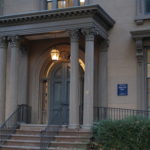Jackson on track to meet fundraising goals, short on professor recruitment, administrators say
Senior University administrators and Jackson leadership express varying levels of optimism on Jackson trajectory.

Yasmine Halmane, Staff Photographer
The Jackson Institute for Global Affairs is on track to meet its yearly fundraising goals to launch as Yale’s newest professional school next fall, but will likely open with less than half the number of faculty it is aiming for, administrators say.
Vice President for Global Strategy Pericles Lewis expressed optimism at the pace with which the Jackson Institute has raised funds and hired faculty from outside the University, pointing in particular to the rapid and unprecedented growth in Yale’s endowment. Jackson Institute Director Jim Levinsohn similarly said that Jackson is on track to meet the immediate goals in order to launch as a new professional school in fall 2022, but that there is significant work still to be done as the school prepares to compete with its peers. He pointed particularly to faculty hiring; Jackson currently has 10 core faculty and ultimately aims to have 30.
In 2019, the University announced that the Jackson Institute would be converted into Yale’s 13th professional school, the first created since 1976. All ladder faculty at the Jackson School will be jointly tenured in another Yale school or department. The Institute also employs a wide array of senior fellows — practitioners who were active in government, diplomacy or business and now teach courses and serve as career mentors. Interdisciplinary courses are taught by affiliated faculty who have appointments at the Institute and another department or school.
“Jackson needs to hit some fundraising targets to launch,” Levinsohn said. “I remain hopeful that the school might open in Fall 2022. The funds needed to launch, though, are not the same as the funds needed to fully build out a new school.”
Levinsohn later clarified that despite any fundraising concerns, he feels that the Jackson Institute will be competitive when it launches. He said that University President Peter Salovey is the one who will ultimately make the call as to whether the school opens in the fall, but that he is optimistic that it will.
One significant cost that both Lewis and Levinsohn mentioned is the process of attracting new faculty to Yale. Lewis said that the ultimate target for faculty members is 30. The Jackson Institute’s website currently lists 10 faculty members as professors of Global Affairs.
Lewis said that once the school has completed its next round of fundraising, it will be in a position to hire new faculty and attract students and fellows. He noted that Jackson has successfully attracted faculty from Harvard, Stanford and Columbia in the last three years and is in the process of finding more.
But Levinsohn said that in his estimation, when the school launches next year, it will not have met its faculty targets. He hopes, however, that fundraising for Jackson is prioritized in the University’s capital campaign, he said.
“We’ve been quite successful with the hiring so far, but there’s no way the entire faculty will be on board next September were the School to open then,” Levinsohn wrote in an email to the News. “Fundraising, then, is going to be ongoing and I hope and expect that Jackson will play a role in the upcoming capital campaign.”
However, Lewis said that the 30-faculty target is a long term goal, and was never intended to be reached by the time of the school’s opening.
Levinsohn said that regardless, the Jackson Institute will eventually need to raise significant funds to attract high-quality ladder faculty in order to meet its 30-faculty goal.
“Jackson is likely to hire about at least 15 more ladder faculty and that too is expensive,” Levinsohn told the News. “The faculty Jackson is going to recruit can typically work anywhere they want to. Attracting them to Yale is going to take resources both in terms of salary and also research support.”
Lewis noted that this process can be lengthy, as many scholars and practitioners in the field that Jackson has approached are already employed by leading institutions.
Levinsohn added that the Princeton School of Public and International Affairs is successful at attracting high-caliber graduate students by “effectively” not charging tuition and offering “generous” stipends. According to him, if Jackson wants to be able to compete at that level, it needs to be able to offer similar inducements.
“If Jackson is going to be best-in-class out of the gate, and I think it will be, Jackson needs to compete for the best talent and that’s expensive,” he wrote in an email. “There’s also the argument that supporting grad students is simply the right thing to do. Jackson’s grads often enter careers of public service and it’s harder to do so if one graduates with a large debt load.”
The director seemed optimistic that the Jackson Institute will be able to offer comparable and competitive financial support for its graduate students when the school opens next year.
Arne Westad, professor of history and Jackson Institute faculty member, suggested that the pandemic is responsible for slowing the speed with which the Jackson Institute was able to launch, but that it has made progress nevertheless.
“We’ve obviously been set back,” Westad said. “It would be much better if that [pandemic] hadn’t happened … But, under the circumstances, I think Jackson is doing remarkably well.”
Westad also echoed both Lewis and Levinsohn, saying that the emphasis of faculty recruitment has to be on external faculty hiring, rather than recruiting faculty from Yale’s other schools and shifting half of their appointments to Jackson.
The Jackson Institute for Global Affairs is located at 55 Hillhouse Ave.








